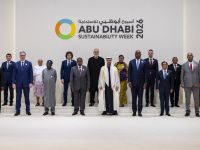NCB Capital, Saudi Arabia's largest investment bank, believes that the economic downturn has tested the region's diversification programme, especially in areas such as real estate, but finds that it has emerged strengthened by continued government commitment, the above-average growth of the non-hydrocarbon sector and a shift of economic activity from the public to the private sector.
Writing in the bank's October GCC Economic Monthly Bulletin, Dr Jarmo Kotilaine, Chief Economist of NCB Capital, said, "As dominant as the oil story still remains, the progress of diversification looks increasingly compelling. Encouragingly, many diversification ventures seem to have developed a critical mass that makes them less dependent on the business cycle suggesting that they are developing a real momentum of their own."
In Saudi Arabia, although the hydrocarbon sector still dominates, the development of the non-oil sector has significantly gathered pace in recent years. The share of oil and gas sector in Saudi GDP (in constant 1999 prices), for example, declined from 34.1% in 2000 to 33.3% in 2005 and thereafter to 28.1% in 2009. A similar pattern can be observed throughout the region.
Initially the focus of diversification policies was on industrialization in energy-intensive areas, but the development of human capital and services has come to be increasingly recognized as a central priority for the sustained success of diversification efforts. It is now widely accepted that sufficient job-creation for the rapidly growing regional population is only possible by boosting the qualifications of the labour force and creating more opportunities in the service sector. As a result, over half the total spending envisaged by the recently approved Saudi ninth five-year plan is to be devoted to the broad category of 'manpower development,' much of it in education and training.
Regional governments have assumed the main responsibility for expanding and modernizing the social and physical infrastructure of the GCC economies but they have also, through direct intervention and investments, facilitated the rise of new sectors, such as petrochemicals and mining. In spite of the impressive gains, the continued heavy presence of the state in the economy, has increasingly come to be recognized as a liability by GCC governments. This has resulted in efforts to shift the primary responsibility of the state from that of an active entrepreneur to a regulator and supervisor, thereby matching trends observed in a number of countries outside the region in recent decades.
The current downturn has significantly tested this paradigm as the governments have stepped in to support aggregate demand but also ensured the continuity of the key diversification ventures, notably large infrastructure projects. Encouragingly, government expenditure has become heavily focused on long-term capital expenditure rather than short-term stimulus.
Nonetheless, in order to maintain the necessary focus of job creation and private sector development, additional steps may be required to ensure a timely retreat of governments from areas where their involvement has been driven by temporary considerations.
Dr Kotilaine concluded, "The main challenge for diversification going forward will be to reduce its dependency on 'derivative' investments, subsidies, and government involvement. The highly energy-intensive nature of growth in the Gulf is increasingly recognized as a problem and efforts are underway to reduce price distortions. Also, the risk of a government overreach must be addressed once the cycle turns."
He stated that the keys to the continued growth of diversification include:
Human and financial capital development.Continued legal and institutional reforms such as reducing controls/restrictions on private sector investment, and a well-defined framework for the privatization of state enterprises.Fostering the development of exportable high value-added goods.







